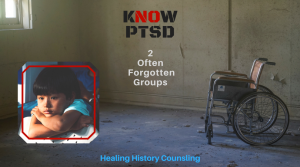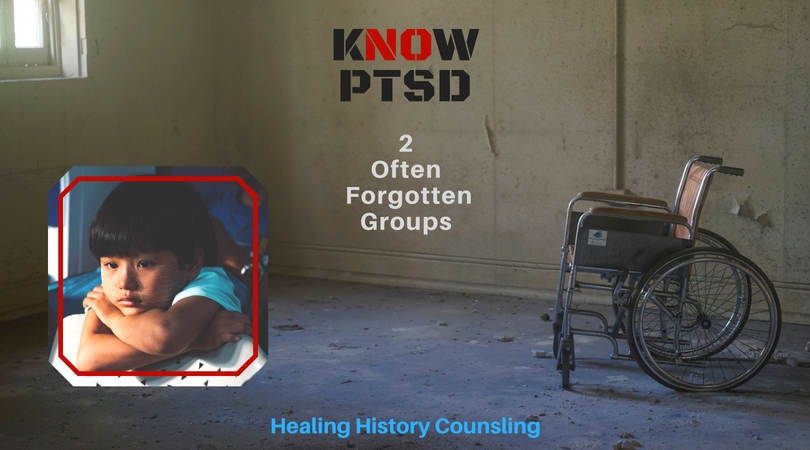

Two Often Overlooked High-Risk Groups
When we think of PTSD we imagine war vets and rape victims. We don’t think of individuals with developmental disabilities nor do we think of individuals who were in the child protective services (DPS), foster care & adoption systems. But these two groups suffer more trauma and develop higher rates of PTSD than even war vets. Both of groups have their own unique challenges.
Recently my son had a seizure that nearly killed him. He had to be put on a breathing machine and spend two nights in intensive care. This would have been traumatic for any sixteen-year-old. It was extra challenging for our son because he is special needs and cannot speak. We have spent the last week helping him work through his terror and traumatization. This got me thinking about trauma treatment with individuals with special needs. Which got me thinking about other groups who experience traumas but are often overlooked during the discussions about PTSD.
Rates of PTSD In These Forgotten Groups
I could not find any research into levels of PTSD in the special needs population, but I discovered that research suggests that individuals with special needs experience abuse and neglect at rates significantly higher than the general population. Some studies find rates 2X’s as high and other studies find as high as 10X’s the rate of the general population. That suggests that there is a significant portion of the special needs population that is struggling with PTSD.
Most kids that come in contact with CPS, the foster system and those that are eventually adopted out of the foster system do so because of abuse and/or neglect. Then there is also the chance of additional traumatization within the child welfare system (I could not find research on the rates of this, but personal experience shows me it does happen). Considering their extreme rates of exposure to events that are known causes of PTSD it is not surprising that a Harvard Medical School (working with the University of Michigan and Casey Family Programs) study found that 25% of adults that had grown up in the child welfare system had PTSD. More than half of them suffered from some form of mental health difficulty.
Unique Challenges of These Forgotten Groups
For individuals with special needs the issues are three-fold.
- Disbelief: We, as a society, don’t want to believe that anyone would abuse or neglect such a population. We so disbelieve it that such cases are almost never prosecuted. When they are, charges have been dropped and guilty verdicts have been overturned by judges who also just wouldn’t believe that individuals would abuse (both cases alluded to above were rape) such individuals.
- Dependency: Many individuals with special needs remain dependent on their parents, guardians, or social services through the rest of their lives. That very dependency makes revealing their abuse or neglect more challenging. They may have extremely limited access to outside resources or contacts.
- Disability: The very nature of their disability may make reporting abuse or neglect almost impossible. My own son cannot talk. How would he tell someone if he was abused? We worry about that each day he gets on the bus and goes to school.
For individuals who are/were in the child welfare system the problems are much more complex.
- Limited Resources: Underfunding is probably the root issue that leads to most of the other issues. Often, when states cut their budgets agencies serving these kids are among the hardest hit.
- Availability: The availability of volunteers and non-profit services, which are a vital part of the services available to these kids, can vary drastically from place to place.
- Quality of services: Many agencies and non-profits use students and recent graduates to be able to provide the most services possible. I did two semesters of my counseling student internship at one such institution and have a great deal of respect for my supervisor and the agency. That does not change the fact that the individuals with the most intense needs often end up being handled by the individuals with the least experience.
- Oversight: Lack of funding also directly impacts how closely the people who provide the services are monitored. This shortfall can lead to less than ideal situations being allowed to continue far longer then they would be with ample funding.
- Repeated moves: Children in the child welfare system can end up living rather transient lives. Repeated changes in placement is very common for the kids in “the system”.
- Lack of continuity of care: Each move often leads to new doctors, teachers, and therapists. Quality of care in these situations is at least partially impacted by the depth of the relationships formed. This is particularly true in therapy.
- Lack of stability: When felt safety (when the individual is not only safe but actually knows they are safe) cannot be achieved the individual will remain in a danger response (Fight, Flight, Freeze, or Fawn). Being in a state of danger response for extended periods is not good for a person’s health, development or trauma recovery.
- Burn out: Most directly tied to poor funding is the overworking and wearing out of the people who work with the kids in “the system”. Working with these kids requires compassion and that can be burned away by a oversized caseload and a system that has become accustomed to burning through staff.
- Limited training: Often the required training to become an integral part of these children’s lives is less than ideal. The child’s court appointed advocate who’s job it is to advocate for the child through process receives just 32 hours of training (this person is also an unpaid volunteer).
Part of the challenge to overcoming the barriers to helping individuals who fit these two categories is the vastness of the challenge. It can feel overwhelming and we can become discouraged when we consider trying to change the whole social services system. But that doesn’t mean there is nothing we can do.
What We Can Do to Help
- Speak up: Next time you’re involved in a discussion that touches on the topic of PTSD, include theses two groups. You could say “Individuals with special needs are 2X’s as likely to be abused or neglected as those without special needs” or “We also have to consider the levels of PTSD in people who have been in the foster system. They’ve been found to have rates twice as high as war vets.”
- Vote: Be an active citizen. Vote for people who you believe will help make sure all people struggling with PTSD can access the help they need. Let the current politicians know that you value PTSD treatment services for all who struggle with it.
- Volunteer: If you have lots of extra time, consider becoming a CASA volunteer. It may be an imperfect service, but it is far better than having no one there to advocate for the kids in “the system”. Don’t have nearly that much time? I totally understand! But there are lots of much less demanding opportunities to help out. Simply Google for volunteer opportunities near you.
- Donate: Non-profit organizations that serve these populations are perpetually short of funds. It doesn’t have to be a lot (if just 0.5% of the greater Austin area population donated $5, that would be over $50,000.00).
If you are a member of one of these two groups, please consider seeking support. If you know of, or just suspect, a child or a person special needs is being abused or neglected – report it! In Texas, every adult is required to report abuse that they suspect is happening to a child, elderly person over 65, or a dependent adult (such as someone with special needs). The Texas report hotline is: (800)252-5400.
Your writing is so relatable and down-to-earth It’s like having a conversation with a good friend Thank you for always being real with your readers
I’ve come across many blogs, but this one truly stands out in terms of quality and authenticity Keep up the amazing work!
Your blog is a ray of sunshine in a sometimes dark and dreary world Thank you for spreading positivity and light
Here, I’ve read some really great content. It’s definitely worth bookmarking for future visits. I’m curious about the amount of work you put into creating such a top-notch educational website.
I appreciate the effort you put into your content.
This is one of the most informative articles I’ve read in a while.